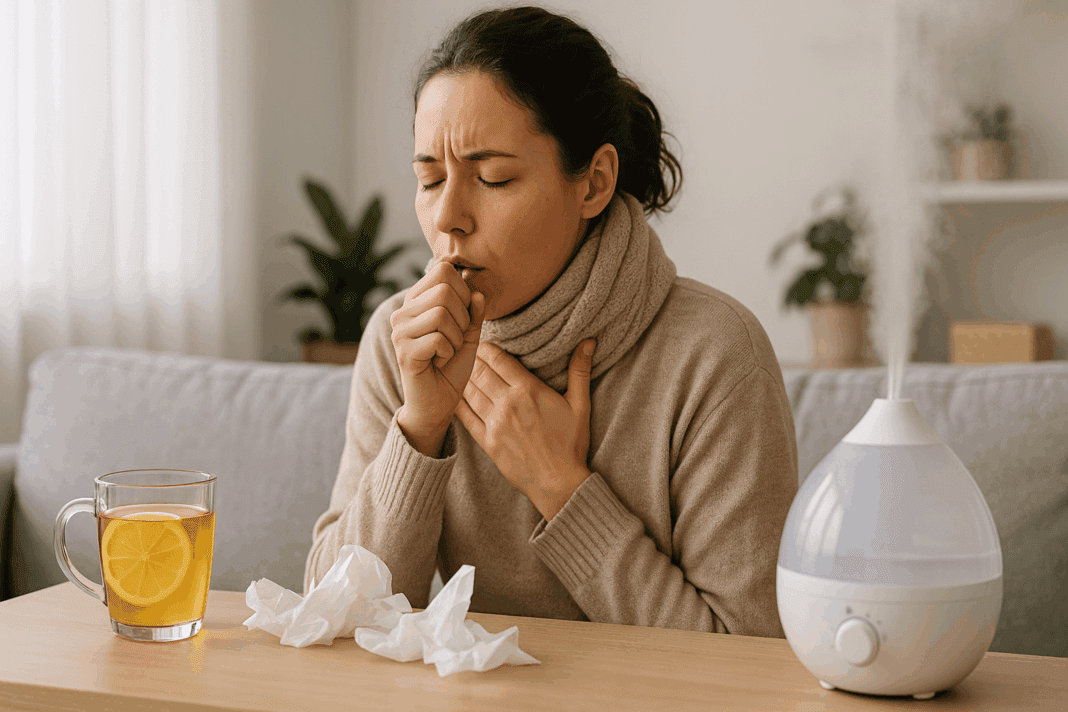An itchy throat and cough are common ailments that most people experience at some point, often together and frequently without warning. While usually minor, these symptoms can signal a wide range of underlying conditions, from allergies and dry air to infections and environmental irritants. Understanding what causes these symptoms, how to relieve them, and when to seek medical attention is essential for anyone seeking lasting relief and improved wellness. This article explores scientifically backed treatments, home remedies, and medical considerations for itchy throat and cough, providing clarity on what works, why it works, and how to manage symptoms safely and effectively.
You may also like: Essential Insights into Natural Treatment for Allergies and Sinus That Actually Work
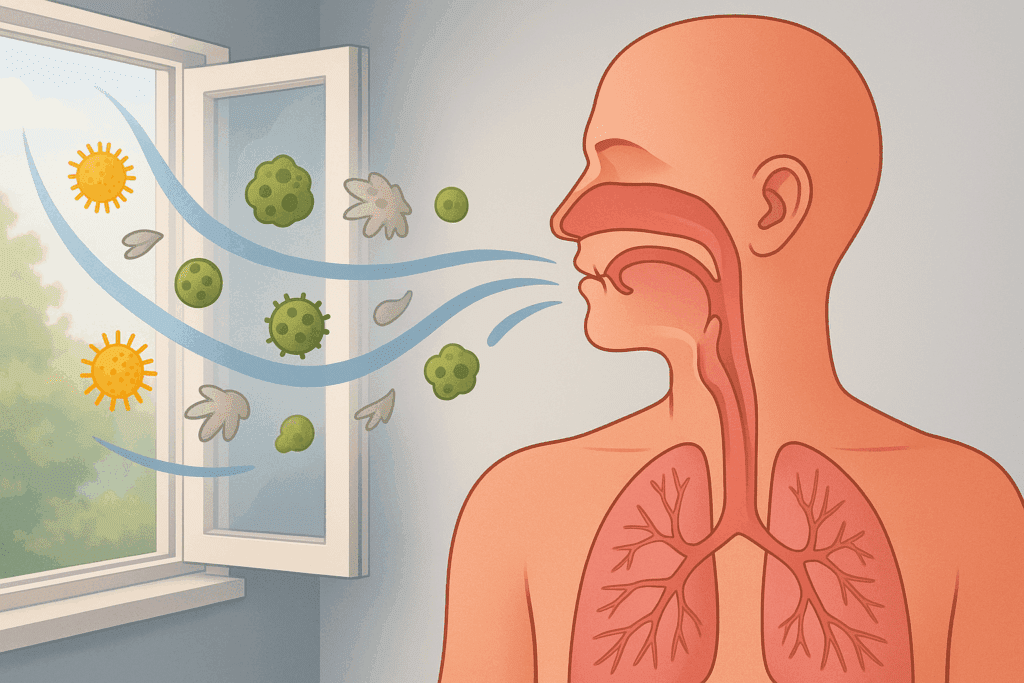
Understanding the Causes of Itchy Throat and Cough
To effectively treat an itchy throat and cough, it is first necessary to understand what might be causing them. These symptoms can result from something as benign as dry indoor air or as serious as a viral infection. One of the most common causes is allergic reaction, often triggered by pollen, dust mites, pet dander, or mold spores. These allergens can irritate the throat and upper respiratory tract, leading to persistent itching and a reflexive cough meant to clear the airways.
Environmental factors also play a significant role. Exposure to smoke, pollutants, or chemical fumes can lead to throat irritation and an inflammatory response. Cold, dry air is another frequent culprit, as it dehydrates mucous membranes, making the throat feel scratchy and dry. Infections such as the common cold, influenza, or even COVID-19 can begin with or include these symptoms, especially during seasonal outbreaks.
Certain lifestyle factors and health behaviors can exacerbate or cause symptoms as well. Dehydration, excessive caffeine or alcohol intake, and speaking for extended periods without rest can all contribute to a dry and itchy throat. In other cases, gastroesophageal reflux disease (GERD) may be the underlying cause, as stomach acid travels up the esophagus and irritates the throat lining.
Lastly, some medications, such as ACE inhibitors used for blood pressure management, list a persistent dry cough as a side effect. Understanding the root cause is critical to choosing the best remedy or deciding whether medical consultation is needed.
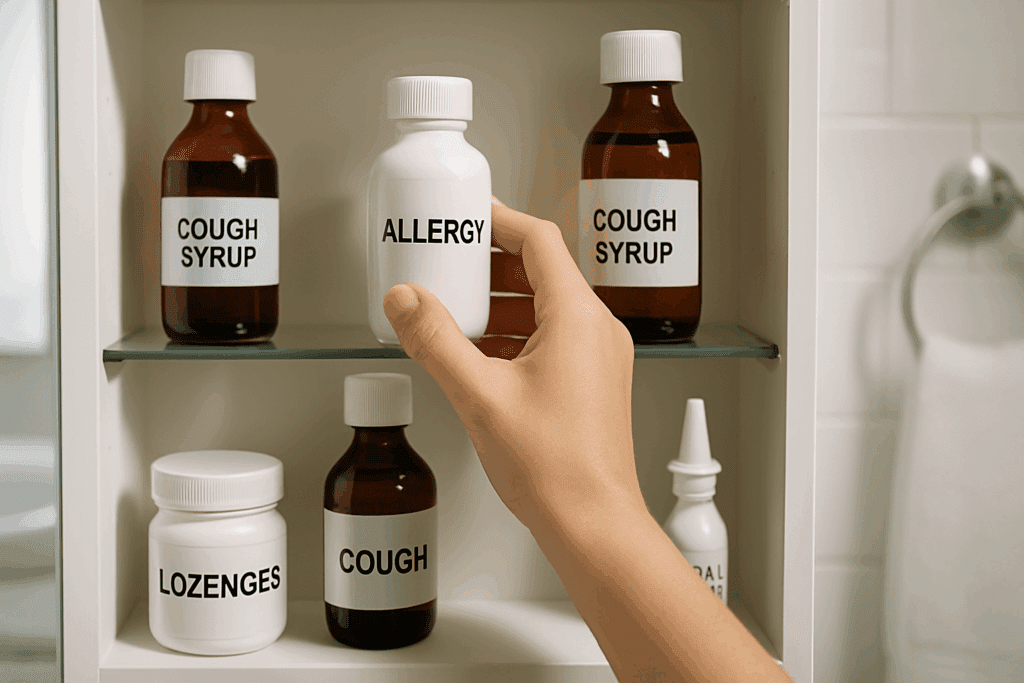
Best Medicine for Itchy Throat: OTC and Prescription Options
When home remedies aren’t enough, pharmacological interventions can provide effective relief. Over-the-counter (OTC) medicines are usually the first line of defense. Antihistamines such as loratadine, cetirizine, or diphenhydramine are often recommended for itchy throat allergies, as they block histamine responses that cause throat irritation and coughing. For individuals suffering from seasonal allergies or hay fever, these medications can reduce inflammation and improve comfort significantly.
Cough suppressants like dextromethorphan and expectorants such as guaifenesin can also play a role in symptom management. While suppressants reduce the urge to cough by acting on the brain’s cough center, expectorants help thin and loosen mucus, making it easier to clear from the airways. The choice between the two often depends on whether the cough is dry or productive.
Lozenges and throat sprays containing anesthetics like benzocaine or menthol can numb the throat and provide temporary relief from soreness and itching. These products are particularly helpful for those who experience intermittent irritation rather than constant discomfort. For bacterial infections such as strep throat, a doctor may prescribe antibiotics, although this is rare for most cases involving an itchy sore throat and cough.
Prescription medications are sometimes necessary for more persistent or serious symptoms. For example, if a patient suffers from chronic postnasal drip caused by allergies or sinusitis, a healthcare provider may recommend corticosteroid nasal sprays like fluticasone or mometasone. In more severe cases, a referral to an allergist or pulmonologist might be appropriate to address underlying chronic conditions.
It is important to read labels carefully, consider any potential interactions with existing medications, and consult a healthcare professional before beginning any new treatment regimen.
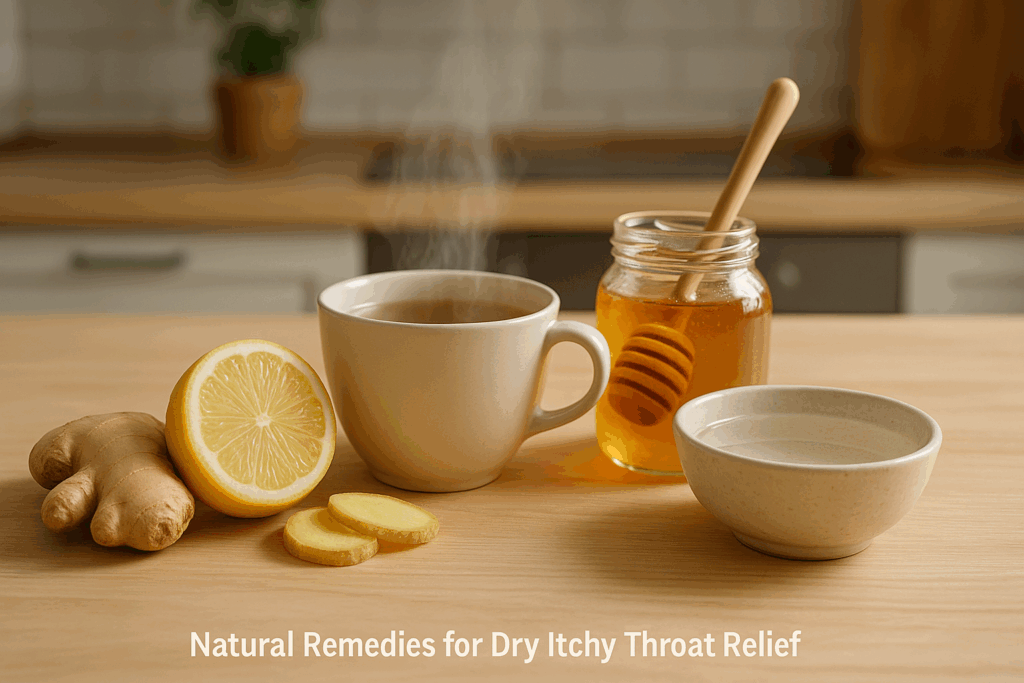
Natural Remedies for Dry and Itchy Throat Relief
While medications offer targeted relief, many individuals prefer to explore natural or home-based treatments first. Staying well-hydrated is one of the simplest and most effective ways to ease a dry and itchy throat. Drinking warm fluids such as herbal teas, broths, and warm water with honey and lemon can help soothe the mucous membranes while reducing inflammation.
Honey, in particular, has antimicrobial and anti-inflammatory properties that make it a trusted remedy for sore throats. A spoonful of honey taken alone or mixed with tea can coat the throat and relieve discomfort. However, honey should not be given to children under the age of one due to the risk of botulism.
Gargling with warm salt water is another widely recommended remedy. Saltwater helps draw out moisture from inflamed tissues, reducing swelling and killing some bacteria. This simple mixture can be used several times a day to maintain throat hygiene and reduce irritation.
Steam inhalation is beneficial for individuals experiencing a dry throat due to congestion or sinus issues. Breathing in steam from a bowl of hot water or during a warm shower can loosen mucus, hydrate the throat, and reduce coughing. Adding essential oils such as eucalyptus or peppermint may enhance the therapeutic effects, although these should be used with caution to avoid allergic reactions.
Using a humidifier in dry indoor environments can also prevent the throat from drying out, especially during colder months. These devices help maintain optimal humidity levels, supporting mucous membrane function and reducing the severity of symptoms. Combined with proper hydration and rest, these natural strategies can offer meaningful relief without the need for pharmaceuticals.
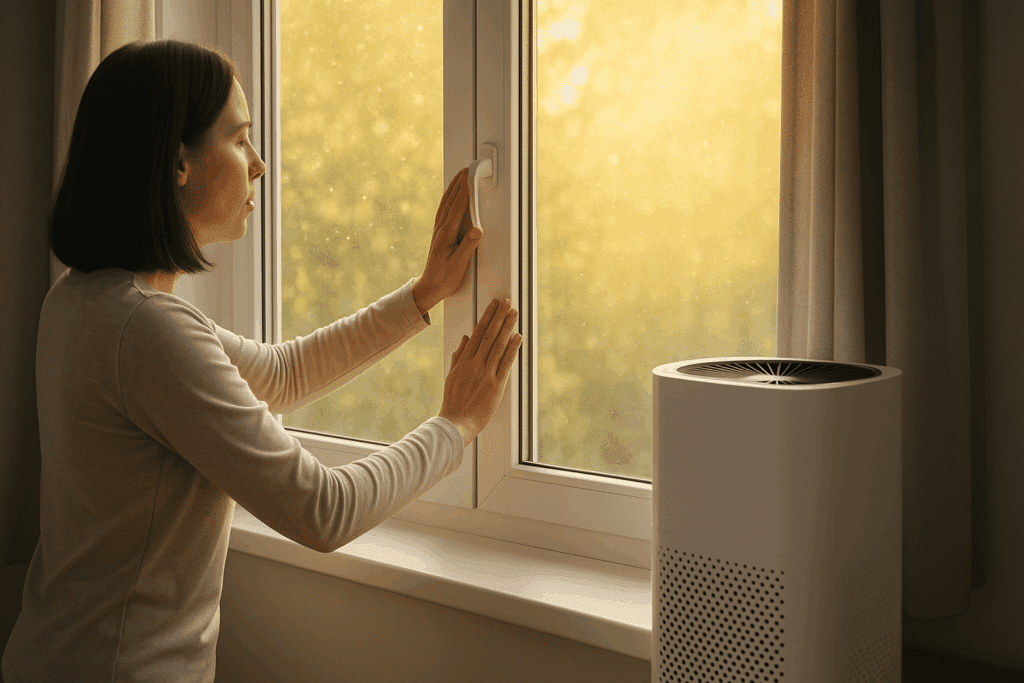
Itchy Throat and Cough Due to Allergies: Understanding and Management
Allergies are one of the most common causes of an itchy throat and cough. These symptoms arise when the immune system overreacts to harmless substances, releasing histamines that cause inflammation and mucus production. For individuals prone to seasonal or perennial allergies, these symptoms can become chronic and disruptive.
Common allergens include pollen, mold, pet dander, and dust mites. These particles are often airborne, making the throat a first point of contact. The body’s attempt to expel these invaders can result in persistent coughing and an irritated throat. Symptoms often worsen in the morning or at night, especially if allergens are present in bedding or the indoor environment.
Managing itchy throat allergies requires a combination of avoidance strategies and symptom control. Keeping windows closed during high pollen seasons, using air purifiers, and regularly cleaning household surfaces can help reduce allergen exposure. Showering and changing clothes after being outdoors can prevent pollen from spreading indoors.
In addition to lifestyle adjustments, pharmacological aids such as antihistamines, nasal corticosteroids, and leukotriene receptor antagonists can significantly reduce allergic responses. Sublingual immunotherapy or allergy shots may be considered for individuals with persistent symptoms that do not respond to standard treatment. These therapies work by gradually desensitizing the immune system to specific allergens over time.
It’s crucial to differentiate allergy-related symptoms from those caused by infections or other medical conditions. A medical evaluation may include allergy testing, a detailed history, and possibly imaging studies if sinus involvement is suspected. The key to managing allergy-induced itchy throat and cough lies in accurate diagnosis and consistent preventive care.
When a Dry and Itchy Throat Signals Something More Serious
Although a dry and itchy throat is usually a minor inconvenience, it can occasionally point to more serious health issues. Prolonged or worsening symptoms, particularly when accompanied by fever, fatigue, or swollen lymph nodes, may suggest an underlying infection or systemic condition that requires professional evaluation.
Chronic laryngitis, GERD, and postnasal drip are all conditions that can mimic or contribute to a persistently scratchy throat. In GERD, for example, acid reflux damages the throat lining, causing chronic irritation and cough. Unlike a typical sore throat, the discomfort in GERD often occurs after meals or when lying down. Similarly, chronic sinusitis can lead to constant drainage that irritates the throat and triggers coughing.
In some cases, persistent throat symptoms may be a sign of vocal strain or even early-stage throat cancer. Risk factors such as smoking, alcohol use, and occupational exposure to irritants increase the likelihood of serious disease. Any throat symptom lasting more than three weeks, especially if accompanied by weight loss or hoarseness, warrants prompt medical attention.
Autoimmune disorders, such as Sjögren’s syndrome, can also cause dryness of the throat, eyes, and mouth due to reduced gland function. In these instances, symptom relief may require systemic treatment and multidisciplinary care.
Understanding the context and pattern of symptoms can help determine whether home care is sufficient or if a more thorough medical evaluation is needed. Paying attention to symptom duration, associated features, and response to initial treatments can provide vital clues.

Why Does My Throat Feel Scratchy? Demystifying Common Triggers
The sensation of a scratchy throat can arise from numerous physiological and environmental factors. Often, it’s the first sign of viral infection, indicating inflammation of the throat tissues as the immune system mounts a response. Unlike a sore throat, which can involve deeper pain and difficulty swallowing, a scratchy throat is more superficial and associated with irritation.
Dry air, particularly during winter or in air-conditioned environments, is a leading non-infectious cause. The lack of humidity dries out the mucosal lining, making it more vulnerable to irritation and damage. This dryness can also impair the natural barrier function of the mucosa, allowing pathogens easier entry into the body.
Talking for extended periods, especially in loud environments, can lead to vocal fatigue and dryness. Singers, teachers, and public speakers are particularly vulnerable. In these cases, vocal hygiene—including hydration, rest, and avoidance of throat clearing—is essential to prevent damage.
Certain foods and drinks may exacerbate symptoms. Spicy foods, caffeine, and alcohol can all dry out or irritate the throat. Identifying and avoiding personal triggers can go a long way in preventing recurrent issues.
Finally, psychological stress and anxiety can exacerbate symptoms or make individuals more aware of bodily sensations. This heightened awareness can amplify the perception of throat discomfort, even in the absence of physical pathology. Managing stress and practicing mindfulness may help reduce symptom perception in these cases.
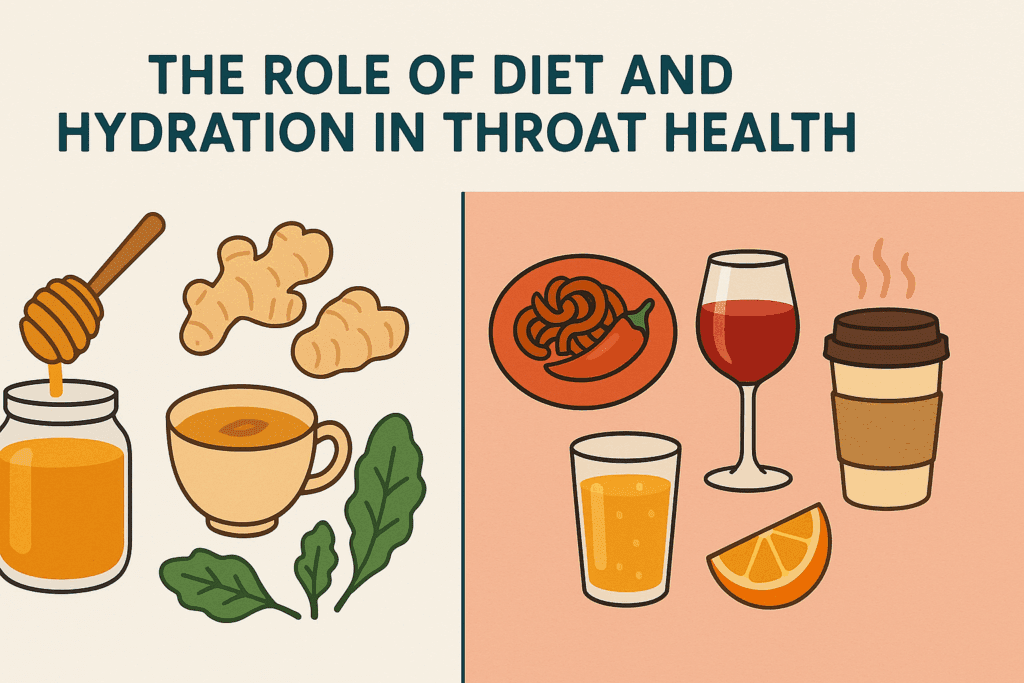
The Role of Diet and Hydration in Throat Health
Nutrition plays a pivotal role in maintaining a healthy throat and immune system. Consuming a balanced diet rich in vitamins, antioxidants, and essential fatty acids can enhance tissue repair and resilience against irritants. Vitamin C, found in citrus fruits, bell peppers, and leafy greens, is particularly important for immune function and collagen synthesis in mucous membranes.
Hydration is equally critical. Water maintains the moisture of throat tissues, facilitates the production of protective mucus, and aids in flushing out pathogens. Individuals experiencing a dry and itchy throat should aim to drink more water throughout the day, especially if they consume dehydrating substances like caffeine or alcohol.
Certain foods may offer specific therapeutic benefits. Ginger, for instance, has anti-inflammatory and antimicrobial properties that make it a popular choice in teas and throat lozenges. Similarly, licorice root can soothe irritated mucosa and is often included in herbal remedies, although it should be used cautiously by individuals with high blood pressure.
Avoiding irritants is just as important as including beneficial foods. Acidic, spicy, and overly salty foods can worsen throat discomfort, particularly in individuals with reflux or sensitivity. Dairy products may increase mucus production in some people, although this effect is highly individual and not universally observed.
Mindful eating—chewing food thoroughly, eating slowly, and avoiding talking while chewing—can also help prevent mechanical irritation and support overall digestive health, further reducing the risk of throat-related symptoms.
Itchy Throat and Cough: When to Seek Medical Attention
While many cases of itchy throat and cough resolve with home care or OTC medications, some scenarios necessitate professional evaluation. A key indicator is the duration of symptoms. If discomfort persists for more than 10 days without improvement, it may be time to consult a healthcare provider.
Fever, chills, difficulty breathing, or chest pain accompanying throat symptoms should never be ignored. These signs may indicate a more serious infection or systemic illness that requires prompt diagnosis and treatment. Similarly, coughing up blood, severe hoarseness, or difficulty swallowing can be red flags for conditions such as bronchitis, pneumonia, or even malignancy.
Recurrent episodes of throat irritation and coughing, especially those linked to allergen exposure or specific environments, should be discussed with an allergist. Testing can reveal sensitivities and guide personalized prevention strategies. For individuals with known chronic conditions like asthma or GERD, worsening throat symptoms may signal the need to adjust medication or lifestyle habits.
Another important consideration is medication side effects. If a new prescription coincides with the onset of symptoms, it is worth exploring whether the drug could be responsible. ACE inhibitors are a well-known example, and alternatives may be available.
Ultimately, seeking medical help is about ensuring peace of mind as much as treatment. A clear diagnosis can prevent unnecessary worry and ensure that minor symptoms don’t evolve into major health issues.
Frequently Asked Questions About Itchy Throat and Cough Relief
What Are the Most Overlooked Environmental Triggers of an Itchy Throat and Cough?
Many people focus on common allergens like pollen and dust mites but often overlook lesser-known environmental triggers. Household cleaning products containing ammonia or bleach can release volatile compounds that irritate the throat lining, leading to persistent coughing and dryness. Indoor mold growth, particularly in hidden areas like behind wallpaper or under carpets, can also provoke symptoms without obvious visual cues. Additionally, scented candles, incense, and certain air fresheners contribute to indoor air pollution, exacerbating both itchy throat allergies and respiratory discomfort. Regular air quality assessments and switching to natural cleaning alternatives can make a substantial difference in reducing these symptoms.
Can Breathing Exercises Alleviate a Dry and Itchy Throat?
While hydration and medication are standard approaches, breathing exercises are an underutilized technique for managing a dry and itchy throat. Practices like pursed-lip breathing or diaphragmatic breathing improve airflow, reduce throat strain, and support respiratory efficiency. These exercises can be especially beneficial for individuals whose cough is aggravated by shallow or rapid breathing patterns, often seen in anxiety or asthma. Over time, controlled breathing may help minimize inflammation by enhancing oxygen exchange and supporting parasympathetic nervous system activation. Incorporating breathing routines into daily wellness habits may help reduce reliance on frequent use of medicine for itchy throat.
Why Does My Throat Feel Scratchy Even When I’m Not Sick?
Experiencing a scratchy sensation in the throat outside of illness is surprisingly common and often linked to lifestyle and occupational habits. Dehydration is one of the leading culprits, particularly in individuals who consume excessive caffeine or forget to drink water throughout the day. Extended screen time can also contribute to a dry and itchy throat due to reduced blinking and mouth breathing, especially in poorly ventilated spaces. Teachers, singers, and call center employees who talk frequently are at increased risk due to constant vocal strain and reduced salivary flow. If you’re wondering, “why does my throat feel scratchy?” the answer may lie in subtle daily habits rather than overt infection or allergy.
What Is the Best Medicine for Itchy Throat During Travel?
Traveling poses unique challenges for individuals prone to itchy throat and cough symptoms, especially when moving between climate zones or spending long hours in airplanes. In such cases, antihistamine-decongestant combinations are often considered the best medicine for itchy throat, as they not only reduce allergic reactions but also help open the airways. Sucking on zinc or elderberry lozenges during a flight can offer both immune support and throat relief. Hydration packs and electrolyte-enhanced beverages can counteract the dehydrating effects of cabin air, which often worsens a dry and itchy throat. Additionally, portable humidifiers and saline nasal sprays can help maintain mucosal moisture during long-haul travel.
How Do Hormonal Fluctuations Affect Itchy Throat and Cough in Women?
Hormonal changes throughout a woman’s life—such as during menstruation, pregnancy, or menopause—can influence mucosal hydration and immune response. During these periods, women may notice an increase in dry and itchy throat symptoms, often accompanied by a persistent cough. Fluctuating estrogen levels can impact mucus membrane thickness and salivary gland output, which may explain the heightened irritation during specific phases of the hormonal cycle. Pregnant women are also more susceptible to GERD, which can lead to an itchy sore throat if stomach acid reaches the esophagus. Tailoring symptom management strategies to hormonal phases may enhance comfort and prevent chronic irritation.
What Are the Long-Term Consequences of Chronic Itchy Throat Allergies?
Chronic itchy throat allergies do more than just cause discomfort; they can gradually alter respiratory health and quality of life. Long-standing exposure to allergens without intervention may lead to conditions like chronic rhinitis, postnasal drip, or even asthma. The persistent coughing associated with these allergies can cause microtrauma to the vocal cords, leading to hoarseness or vocal fatigue over time. Recurrent inflammation may also increase susceptibility to secondary infections by weakening the throat’s natural barrier functions. Addressing the root cause and finding a long-term solution—whether through immunotherapy, lifestyle changes, or environmental control—is essential for lasting relief and throat health.
Why Is My Throat Itchy Only at Night?
An itchy throat that appears predominantly at night may be linked to environmental or physiological shifts that occur during sleep hours. For example, lying down can exacerbate acid reflux, allowing stomach acid to reach the esophagus and irritate the throat lining. Additionally, sleeping in dry environments with low humidity contributes to mucosal dehydration and morning throat irritation. Dust mites and pet dander trapped in bedding are other hidden allergens that intensify itchy throat allergies during the night. Understanding why is my throat itchy after bedtime often leads to practical solutions such as elevating the head, using allergen-proof mattress covers, and running a humidifier overnight.
Can Oral Hygiene Influence a Persistent Itchy Sore Throat?
Yes, oral hygiene plays a significant role in throat comfort and overall respiratory health. Neglecting regular brushing and tongue cleaning can allow bacteria to accumulate, especially in the back of the mouth and throat. This microbial buildup can contribute to a low-grade inflammatory response, leading to a recurring itchy sore throat. Individuals who breathe through their mouths at night or suffer from dry mouth due to medication may also experience worsened symptoms without adequate oral care. Using a fluoride mouthwash, staying hydrated, and maintaining consistent dental hygiene are simple yet effective measures to prevent lingering throat irritation.
Itchy Throat and Cough: Could It Be Neurological?
While often overlooked, neurological factors can sometimes explain persistent sensations like an itchy throat and cough. This phenomenon, known as sensory neuropathic cough, occurs when nerve endings in the throat become hypersensitive, often due to trauma, viral infection, or chronic irritation. Patients may describe the feeling as a tickle or electric shock, and traditional treatments for allergies or infections may offer little relief. Gabapentin or amitriptyline, medications typically used for nerve pain, have shown promise in such cases. If conventional explanations for an itchy throat and cough have been exhausted, consulting a neurologist or ENT specialist may reveal alternative causes rooted in nerve function.
Which Herbal Approaches Offer Emerging Promise for Dry and Itchy Throat?
Herbal medicine continues to gain popularity as people seek gentle yet effective remedies for throat discomfort. Marshmallow root, for instance, contains mucilage that coats and soothes irritated mucosal linings, offering a natural alternative to synthetic lozenges. Slippery elm has similar demulcent properties and is available in teas or chewable tablets that provide relief for dry and itchy throat symptoms. Mullein leaf, traditionally used in respiratory tonics, may help ease coughing associated with throat irritation. Though often dismissed as folk remedies, these botanicals are gaining scientific backing for their soothing effects. It’s important, however, to verify product quality and consult a healthcare provider before integrating herbal solutions with conventional medicine for itchy throat.
Conclusion: Managing Itchy Throat and Cough with Confidence and Clarity
Managing an itchy throat and cough requires a balanced approach that combines symptom relief with a deeper understanding of underlying causes. By recognizing the roles of allergies, infections, environmental factors, and lifestyle habits, individuals can make informed decisions about their health. Whether through hydration, home remedies, OTC medications, or professional care, there are numerous proven strategies for achieving relief.
This comprehensive approach not only alleviates immediate discomfort but also supports long-term wellness and immune resilience. With the proper tools and knowledge, anyone can navigate the discomfort of an itchy throat and cough with greater confidence, knowing when to treat symptoms at home and when to seek expert help.
Further Reading:
Itchy Throat, Ears, and Nose – Know When To Call A Doctor


